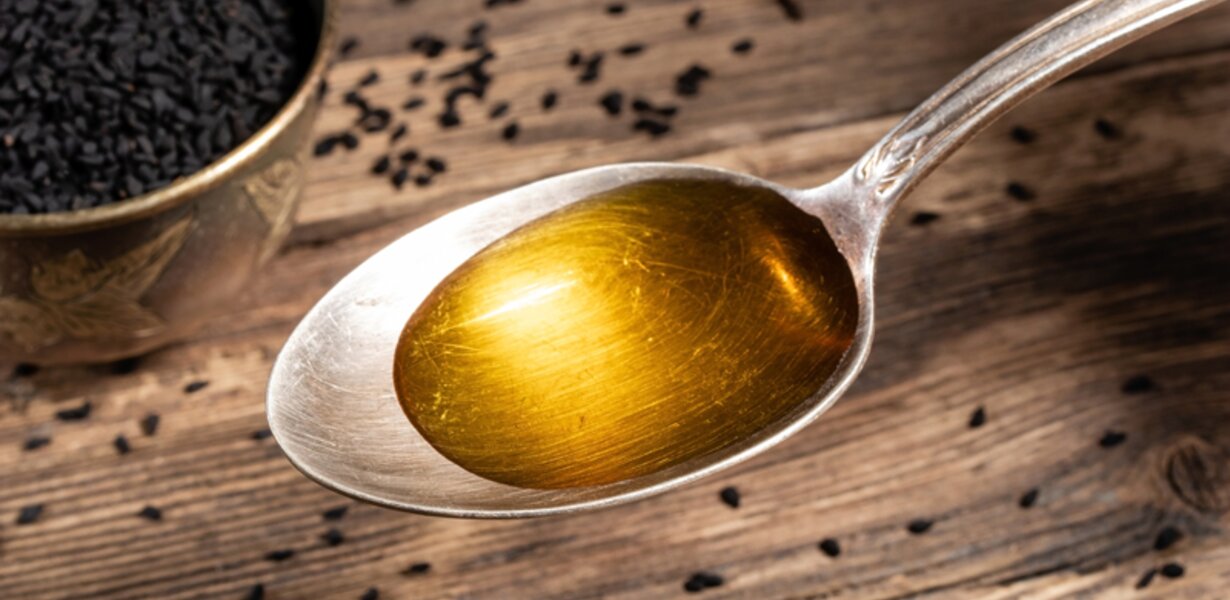Caraway, cumin (jeera), black caraway (Nigella) seed. What sounds confusingly similar in the German language differs from a botanical perspective. While all three named agents “bring spice into our lives” as spices, the traditional herbal medicine practitioners of the Bosporus have been swearing by the health-promoting effect of black caraway oil (also known as black seed oil) for thousands of years. But what does modern science say about natural home remedies? And why do allergy sufferers regain their sense of well-being with black caraway oil?
What is black caraway oil?
Black caraway oil is a herbal, peppery flavoured oil that is obtained from the velvety-black seeds of black caraway (Nigella sativa). For thousands of years, genuine black caraway has been cultivated in the West Asian region (Turkey, Iraq) and is regarded as both a spice and a medicinal plant. From the Bosporus, it soon started its triumphant march to North Africa, Southern Europe, India and Pakistan, and established itself not only in the kitchens there, but also in traditional herbal medicine.
In cold-pressed form, black caraway oil provides an interesting mixture of unsaturated fatty acids and a wealth of other active substances. Among the most exciting ingredients are the rare Omega-6 fatty acid gamma-linolenic acid and the two secondary plant substances alpha-hederin and thymoquinone.
Production of black caraway oil
To produce the yellow to greenish-brown "elixir" from the aromatic seeds of the genuine black caraway, the small bundles of active ingredients are first dried and then pressed. If you want to use black caraway oil as a natural home remedy, you should definitely use cold-pressed products, as the valuable ingredients are better preserved during the gentle cold-pressing process.
Effect of black caraway oil
Since ancient times, black caraway oil has been used as a natural remedy for numerous complaints and has been known as the “Gold of the Pharaohs”. The cold-pressed oil is said to, among other things, alleviate digestive problems, inhibit inflammation and microbes and regulate the immune system. The oil is used externally to care for the skin and hair as well as for special skin problems such as psoriasis or neurodermatitis.
In the meantime, hundreds of scientific studies have proven the therapeutic properties of black caraway oil. While many of them examined individual active substances in the laboratory, others examined the effect of the entire package on humans.
The latter include studies investigating the use of black caraway oil in allergies. Here, the use not only led to a noticeable alleviation of the allergic symptoms - the effect was also reflected in the corresponding clinical parameters. In order for pollen allergy sufferers to regain use of their noses more easily in the warm spring air, they should start taking it a few weeks before the start of the pollen season. According to studies, people with atopic eczema and asthma also benefit from black caraway oil.
The positive effect of black caraway (oil) on certain lifestyle diseases, such as type 2 diabetes mellitus, dyslipidaemia and high blood pressure, has also been well studied. However, whether black caraway oil actually has the potential to reduce a cardiovascular risk still needs to be clarified in further large-scale studies.
Black caraway oil: Capsules or oil? And what should I consider in terms of quality?
If you are already familiar with the taste of black caraway oil, you know you should pay attention to high quality when buying this fine liquid. The oil should be cold-pressed and be bio-quality. Both are considered special quality features that are noted on the product packaging. If one or other of the indications is missing, it can be assumed that the oil has been heated or that the seeds come from conventional cultivation.
The exact dosage option as well as the question of taste speak for black caraway oil in capsule form. After all, the intense taste – especially if taken every day – is not to everyone’s liking. Others appreciate the oriental aroma of this high-quality oil, that gives dishes a very special flavour
References:
Chrubasik-Hausmann, S. 2018. Schwarzkümmel (Nigella sativum). https://www.uniklinik-freiburg.de/fileadmin/mediapool/08_institute/rechtsmedizin/pdf/Addenda/Schwarzk%C3%BCmmel.pdf. Aufgerufen am
Vlachojannis, J., Chrubasik-Hausmann, S. 2019. Schwarzkümmel: Medizin-Tipp aus der Bibel. Teil 1: Experimentell nachgewiesene Wirkungen von Samen und Öl. Z Phytother. 40(01):9–13.
Nikakhlagh, S. et al. 2011. Herbal treatment of allergic rhinitis: the use of Nigella sativa. Am J Otolaryngol. 32(5):402–7. https://pubmed.ncbi.nlm.nih.gov/20947211/
Gholamnezhad, Z. et al. 2019. Clinical and experimental effects of Nigella sativa and its constituents on respiratory and allergic disorders. Avicenna J Phytomed. 9(3):195–212. https://pubmed.ncbi.nlm.nih.gov/31143688/
Hamdan, A. et al. 2019. Effects of Nigella Sativa on Type-2 Diabetes Mellitus: A Systematic Review. Int J Environ Res Public Health. 16(24):4911. https://pubmed.ncbi.nlm.nih.gov/31817324/
Hallajzadeh, J. et al. 2020. Effects of Nigella sativa on glycemic control, lipid profiles, and biomarkers of inflammatory and oxidative stress: A systematic review and meta-analysis of randomized controlled clinical trials. Phytother Res. 34(10):2586–608. https://pubmed.ncbi.nlm.nih.gov/32394508/
Sahebkar, A. et al. 2016. Nigella sativa (black seed) effects on plasma lipid concentrations in humans: A systematic review and meta-analysis of randomized placebo-controlled trial. Pharmacol Res. 106:37–50. https://pubmed.ncbi.nlm.nih.gov/26875640/
Maaideen, N. M. P. et al. 2020. Nigella Sativa (Black seeds), a Potential herb for the Pharmacotherapeutic Management of Hypertension – A Review. Curr Cardiol Rev. doi: 10.2174/1573403X16666201110125906. https://pubmed.ncbi.nlm.nih.gov/33172379/









